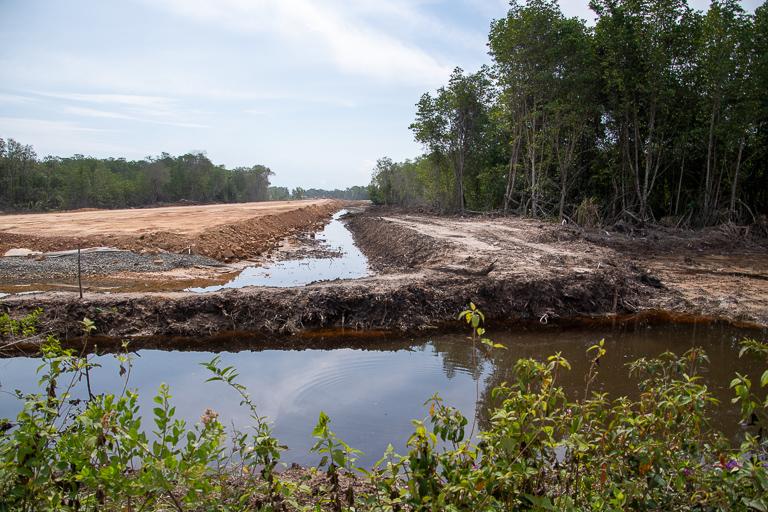A planned Pan-Borneo highway threatens ancient, pristine wilderness
Highway construction cuts through mangrove in northwestern Sabah, on the island of Borneo.
A planned 1,243-mile Pan-Borneo highway connecting the three nations that make up the island of Borneo — Malaysia, Indonesia and Brunei — will make it easier for residents and ecotourists to move in and out of its lush landscape, home to several World Heritage sites. But the plan also raises grave concerns that the road will provide easier access to illegal loggers and poachers who want to plunder those natural treasures.
Related: In Borneo, healthy people equals healthy forests
The rainforests in Borneo are about 130 million years old, some of the oldest in the world. Because Borneo is an island, many of its species have evolved independently and differently from species in the surrounding area. Thousands of its plants and animals are found nowhere else on Earth.
Mongabay reporter John Cannon traveled the paved and yet-to-be-paved portions of the proposed highway and wrote a six-part series about his journey. He says scientists and conservationists fear the adverse affects the road could have on Borneo’s unique environment.
“Roads, especially in the tropics, can be very damaging ecologically,” he says. “A lot of research over the past couple of decades has shown that when a road enters an area, people are very quick to follow. They’ll come in, they’ll set up settlements, they’ll start cutting down the forest for farms, they might start hunting the animals in those areas. What this tells us is that roads are really the access point for us as humans to get to these farther-flung places and that when we do go into these places, we’re going to be affecting the other species that are already there.”
Related: Indonesia’s bold plan: Moving its capital to an island paradise
The proposed road will cut through the southern Malaysian state of Sarawak, all the way the southwestern tip of Borneo, where there is a wildlife sanctuary and a national park. The national park, specifically, has beautiful primary forest and is full of unique animals, Cannon says.
Road plans include some ideas for ways to lessen the impact on wildlife, Cannon adds. For example, crews can build underpasses or overpasses for the animals to cross, which might save them, as well as humans from vehicle collisions. Scientists and conservationists have concerns about the efficacy of these ideas, Cannon says.
“It might sound like an easy solution to just put a bridge in and that’s where the animals will pass, but as anybody who has a pet knows, animals aren’t always cooperative, especially wild animals. They might not choose to take that particular route across the road.”
In addition, Cannon says, research in peninsular Malaysia has shown that underpasses or overpasses can become “pinch points, where predators, including human poachers in some cases, will actually wait … and it’s an easy meal if you’re a predator and easy kill if you’re a poacher. So, the jury’s still out on how effective these tools can be.”
Related: A village’s first female chief ended illegal logging with spies
Cannon acknowledges that he and others feel conflicted about how to balance concerns over wildlife with the knowledge that roads can sometimes bring tangible benefits to local residents.
Baru Bian, the Minister of Works, expressed to Cannon his enthusiasm for building the road because it would connect people, some of whom are his own relatives, more easily to markets, schools and health clinics.
“I think it was something that made this reporting very difficult because I’ve spent time with the ecologists who are very concerned about the impacts that this will have on what is some of the last, best remaining rain forest on Earth,” Cannon explains. “But they, just like me, I think are conflicted, as well.”
This article is based on an interview that aired on PRI’s Living on Earth with Steve Curwood.
